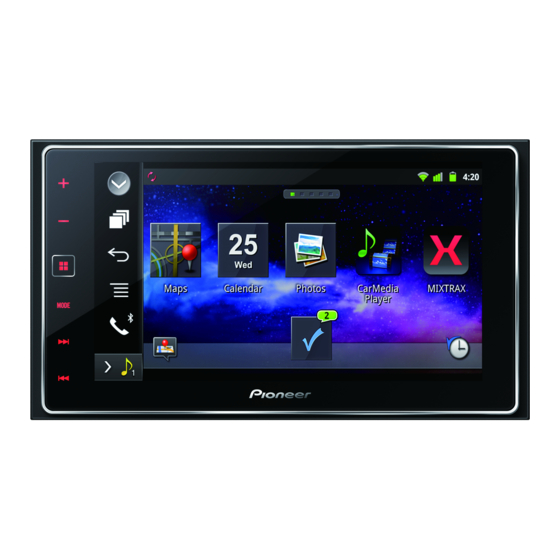Pioneer SPH-DA210 Benutzerhandbuch - Seite 17
Blättern Sie online oder laden Sie pdf Benutzerhandbuch für Auto-Empfänger Pioneer SPH-DA210 herunter. Pioneer SPH-DA210 36 Seiten. In-dash iphone and android compatible car receiver with 7" capacitive multi-touchscreen, dvd/cd player, bluetooth, mirrorlink, and on-screen access to compatible apps
Auch für Pioneer SPH-DA210: Installationshandbuch (20 seiten), Installationshandbuch (48 seiten)

Appendix
Specifications
General
Rated power source............ 14.4 V DC
Grounding system ..............Negative type
Maximum current consumption
......................................10.0 A
Dimensions (W × H × D):
Chassis ....................... 178 mm × 100 mm × 168 mm
Nose ........................... 171 mm × 97 mm × 16 mm
Weight
SPH-DA210 ...................2.2 kg (4.9 lbs)
SPH-DA110 ...................1.5 kg (3.3 lbs)
Display
Screen size/aspect ratio .... 7 inch wide/16:9
Pixels ....................................384 000 (800 × 480)
Display method ...................TFT Active matrix driving
Backlight ............................LED
Color system .......................NTSC
Tolerable temperature range:
Power on ......................+14 °F to +140 °F
Power off ......................−4 °F to +176 °F
Angle adjustment
SPH-DA210 ...................0° to 35°
SPH-DA110 ...................0°
Audio
Maximum power output ..... 50 W × 4
Continuous power
output .................................. 22 W × 4 (50 Hz to 15 kHz,
Load impedance ................ 4
Preout output level (max) ..... 2.2 V
Preout impedance .............1 k
Equalizer (5-Band Graphic Equalizer):
Frequency .................... 100 Hz/315 Hz/1.25 kHz/
Gain ..............................±12 dB
Loudness contour:
Low ...............................3.5 dB (100 Hz), 3 dB (10 kHz)
Mid ...............................10 dB (100 Hz), 6.5 dB
(allowable voltage range:
10.8 V to 15.1 V DC)
(7 in. × 3-7/8 in. × 6-5/8 in.)
(6-3/4 in. × 3-7/8 in. ×
5/8 in.)
(effective display area:
156.6 mm × 81.6 mm
:6-1/8 in. × 3-1/4 in.)
50 W × 2 ch/4 Ω + 70 W ×
1 ch/2 Ω
(for subwoofer)
5 %THD, 4 Ω LOAD, Both
Channels Driven)
Ω
Ω
Ω
Ω for
(4
to 8
[2
1 ch]
allowable)
Ω
3.15 kHz/8 kHz
(10 kHz)
High ............................. 11 dB (100 Hz), 11 dB (10 kHz)
HPF:
Frequency .................... 50 Hz/63 Hz/80 Hz/
Slope ............................−12 dB/oct
Subwoofer:
Frequency .................... 50 Hz/63 Hz/80 Hz/
Slope ............................−18 dB/oct
Gain ..............................−24/+6 dB
Phase ...........................Normal/Reverse
Bass boost:
Gain ..............................0 dB to +12 dB
DVD drive (SPH-DA210)
System ............................DVD-Video, CD, MP3,
Usable discs ........................DVD-Video, DVD-R(DL),
Region number ..................1
Signal format:
Sampling frequency ....44.1 kHz/48 kHz/96 kHz
Number of quantization
bits .................................16 bit/20 bit/24 bit; linear
Frequency response ....5 Hz to 44 000 Hz (with DVD,
Signal-to-noise ratio ...........97 dB (1 kHz) (IHF-A
Dynamic range ...................95 dB (1 kHz) (CD: 94 dB
Distortion .............................0.008% (1 kHz)
Output level:
Video ..............................1.0 Vp-p/75 Ω (±0.2 V)
Audio .............................1.0 V (1 kHz, 0 dB)
Number of channels...........2 (stereo)
MP3 decoding format.........MPEG-1, 2 & 2.5 Audio Layer 3
WMA decoding format .......Ver. 7, 8 & 9
AAC decoding format .........MPEG-4 AAC (only encoded
Bluetooth
Version ................................Bluetooth 3.0
Output power ......................+ 4 dBm Max. (Power class 2)
FM tuner
Frequency range ................87.9 MHz to 107.9 MHz
Usable sensitivity ................ 9 dBf (0.8 μV/75
Signal-to-noise ratio ...........72 dB (IHF-A network)
Distortion ............................. 0.3 % (at 65 dBf, 1 kHz,
(Volume: −30 dB)
100 Hz/125 Hz
100 Hz/125 Hz
WMA, AAC system
DVD-RW, CD-ROM, CD-DA,
CD-R/RW
at sampling frequency 96 kHz)
network) (CD: 96 dB (1 kHz)
(IHF-A network))
( 1 kHz))
by iTunes): .m4a
Ω
, mono,
S/N: 30 dB)
stereo)
0.1 % (at 65 dBf, 1 kHz,
mono)
En
Appendix
17
